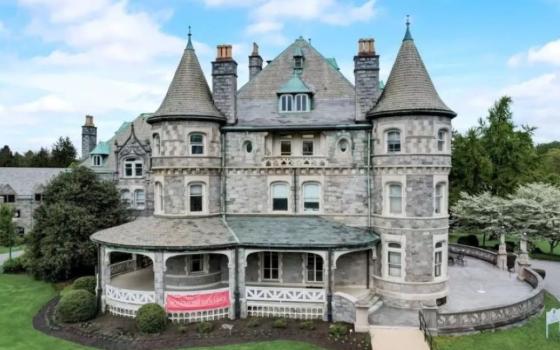Nicaraguans carry a statue of Mary during an Aug. 14, 2018, pilgrimage in Leon to demand an end to violence in the country. Pope Francis and the country's bishops in exile prayed for Nicaragua as the Central American country observed the Immaculate Conception of Mary amid persecution on Dec. 8, 2024. (OSV News/Oswaldo Rivas, Reuters)
Pope Francis and the country's bishops in exile prayed for Nicaragua as the Central American country observed the Immaculate Conception of Mary amid persecution.
"I invite you to join me in prayer for the Church and people of Nicaragua, who celebrate the Purísima" — as the Nicaraguan celebration of the Immaculate Conception is known — "as Mother and Patroness," and lift to her "a cry of faith and hope," Francis said during his Angelus prayer on Dec. 8.
"May the heavenly mother be a consolation in difficulties and uncertainties, and open everyone's hearts, so that the way of respectful and constructive dialogue may be sought, in order to promote peace, fraternity and harmony in the country," Francis said.
The pope's comments marked the second time in December that he offered prayers and expressed support for the Nicaraguan people. "This makes us happy," an exiled priest said in a brief message. "Perhaps it's never too late."
On Dec. 2, in a special letter to the people of Nicaragua, the Pope wrote: "I am with you, especially in these days when you are celebrating the Novena of the Immaculate Conception."
Nicaraguans celebrate the Purísima with a novena. They traditionally build altars and gather at parishes for "la gritería," or "the shouting.' In la gritería, the people shout, "Who is it that brings this joy?" to which the response is given, "The conception of Mary!"
The Purísima came amid persecution for Nicaraguan Catholics in 2024, however, as the ruling Sandinista regime cracked down on religious activities such as processions and large public gatherings. Social media photos from the Purísima celebration inside the Managua Cathedral showed Cardinal Leopoldo Brenes overseeing la gritería.
But Nicaraguan journalist Israel González Espinosa noted on X, formerly known as Twitter, "This celebration always has been held in the atrium … with lights, sound, fireworks and broadcast on the main TV stations."
Nicaraguans abroad — including those exiled by the regime — also gathered for la gritería as an expression of faith, along with national pride and defiance.
Advertisement
"This community, which loves the Virgin, is experiencing terrible times of oppression, persecution, injustice, of a cruel and totalitarian power that has taken away all freedoms from the population and turned the country into a giant prison," Auxiliary Bishop Silvio José Báez of Managua said during his Dec. 8 homily in Miami, where he ministers in exile.
"But they have not been able to extinguish the joy that comes from love for the Virgin," he said of government crackdowns.
The United States diplomatic mission in Nicaragua also expressed their closeness with the people of the country with a special message that Head of Mission Kevin O'Reilly recorded on Dec. 7 and posted on X.
O'Reilly called La Purísima, "a day on which the centrality of faith and cultural traditions in our lives is evident." He said the feast "reflects the deep strength and hopes of the Nicaraguan people, uniting them without distinctions of any kind," representing not only "religious devotion, but also a unique experience for every Nicaraguan."
O'Reilly exclaimed, with a cheerful voice: "Mary of Nicaragua. Nicaragua of Mary. Who is it that brings this joy?"
President Daniel Ortega and his wife, Vice President Rosario Murillo, have curtailed freedom of worship and the ability of priests to preach freely in recent years as they take Nicaragua increasingly toward totalitarianism.
Three bishops have been forced to leave the country over the past year after running afoul of the regime, including the president of the Nicaraguan bishops' conference, Bishop Carlos Enrique Herrera of Jinotega. Dozens more priests have been sent into exile or not been allowed to return to Nicaragua after traveling abroad.
A new constitution, expected to be enacted in January, will make Ortega and Murillo co-presidents and expand their influence over congress and the courts. It also could complicate the Nicaraguan church's relationship with the Vatican as it says religious organizations in the country must be "free from all foreign control."
"What Ortega wants is to achieve a relationship of total, complete, unconditional submission of the Catholic Church in Nicaragua," Arturo McFields, a former Nicaraguan diplomat, told OSV News. "They want absolute control over ... not only what they say, but who they are, who is elected."







